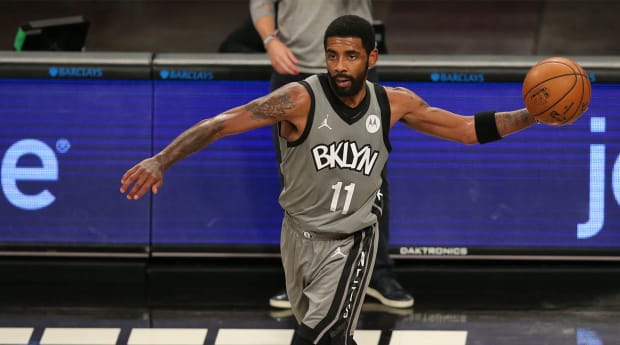The arrival of James Harden has given Brooklyn a true Big Three—if Irving is committed to being a part of it.
Kyrie Irving addressed reporters on Tuesday, two weeks after his last game, four days after the NBA fined him $50,000 for violating its health and safety protocols and 24 hours before he is scheduled to return to a lineup that will look decidedly different than the one he left.
Over 12 minutes on a Zoom call, Irving said very little.
But in saying little, he said a lot.
Irving wasn’t interested in publicly explaining his absence. “Lot of family and personal stuff going on,” Irving said. He wasn’t inclined to address his violation of league protocols, which came to light after a video surfaced of a mask-less Irving at a family birthday party. “Happy to be back,” Irving deadpanned. When asked if he was OK, Irving, his body slumped forward in his seat, his arms crossed, his chin resting on his forearms, simply nodded in the affirmative.
Irving isn’t under any obligation to publicly explain anything, of course. He says he addressed his teammates, some individually, and was ready to move on. Those teammates have been supportive. Steve Nash has expressed excitement about Irving coming back. The arrival of James Harden has given Brooklyn a true Big Three—if Irving is committed to being a part of it.
Irving is back, but if there is a takeaway from Irving’s media availability it’s that whatever pushed him away from the team is still weighing on him. Irving has always been quirky, the controversies he’s become embroiled in (flat Earth, subtle digs at ex-teammate LeBron James, etc) often self-inflicted. This, though, feels different. In the aftermath of the high profile killings of Breonna Taylor and George Floyd, Irving embraced the growing social justice movement. Last June, Irving was among the louder voices urging players to consider boycotting the NBA restart. Irving’s last game was January 5th. A day later, violent domestic terrorists attacked the U.S. Capitol.
Irving said he has had to create a “separation” between the current political climate and playing in the NBA.
He also said the event of recent months were “hard to ignore.”
“I'd be lying sitting here and saying I don't feel what's going on in the world, nor am I paying attention to it,” Irving said. “I just have a huge responsibility, I feel, to continue to serve my community and the underserved. And when I'm out here playing, it's continuing to leave knowledge with these guys and commit to something, like I always say, bigger than ourselves.”

There could be another problem. The Nets are a better team than the one Irving left. Harden has been brilliant in his first two games in Brooklyn. He racked up a 30-point triple double in his Nets debut. He followed it up with a 34-point, 12-assist effort in a narrow win over Milwaukee. His reunion with Durant, a former Oklahoma City teammate, has looked seamless.
Irving should be thrilled about joining a team with this kind of firepower. And perhaps he is. But this is Irving. He forced a trade out of Cleveland just a year after winning a championship. He bolted Boston months after publicly proclaiming he was coming back. In 2019, Irving, in control of his future for the first time, chose Brooklyn, chose Durant, chose to chase a championship in his home market with his closest friend.
He didn’t choose to do anything with Harden. Asked about the addition of Harden, Irving’s response felt measured. “It’s really exciting to be able to play with great players who have been here in the league for a while,” Irving said. “Been through ups and downs, peaks and valleys. James is aligned with us in terms of experience. Adding that to our locker room is going to be great for us.”
Sound like a player eager for another Big Three experience?
“When things become overwhelming in life, you've just got to take a step back and realize what's important," Irving said. “And I love to play -- it's never been a question. I've committed myself, when this wasn't even a thing for me.”
Irving’s buy-in is critical to Brooklyn’s success. The Nets are far from flawless. The trade, coupled with the loss of Spencer Dinwiddie to an ACL injury, robbed the team of its depth. The defense, already shaky, is worse. There’s a lot of responsibility being placed on DeAndre Jordan and Jeff Green. Harden’s early play is promising. He’s shown a willingness to be a playmaker, important for a team that will need to share the ball.
But will Irving embrace a role that moves him off the ball more?
Will Irving, who signed on to play with Durant, be willing to sacrifice more of his offense to play with Harden?
“Very excited,” Irving said, sounding anything but.
Irving is not a bad guy. He has paid the tuition for kids at his former high school, The Patrick School. He has, quite literally, provided the money to save the school from closing. He has renovated the gym, locker room and weight room. On Tuesday, Irving confirmed he was involved in buying a home for the family of Floyd, who was killed by a Minneapolis police officer last May. He doesn’t seek credit—the Floyd story only surfaced after Stephen Jackson, a close friend of Floyd, revealed it on a podcast.
But Irving is complicated. He likes to play basketball, but doesn’t care for some of the responsibilities that come with it. He wants to win, but seems to only want to do it on his own terms. He can be part of something special in Brooklyn, a championship team that can rack up titles for years to come. Or he can decide this situation isn’t for him, and be part of the reason it unravels.